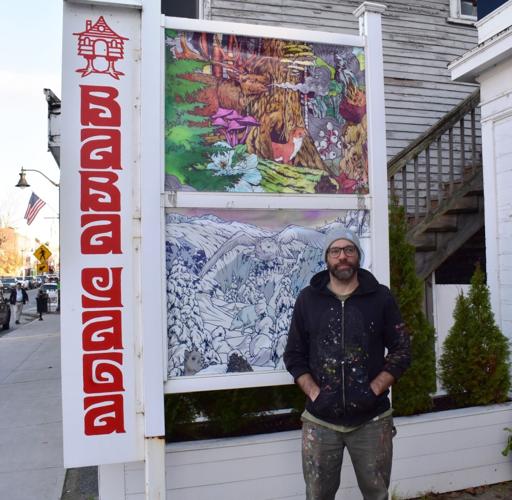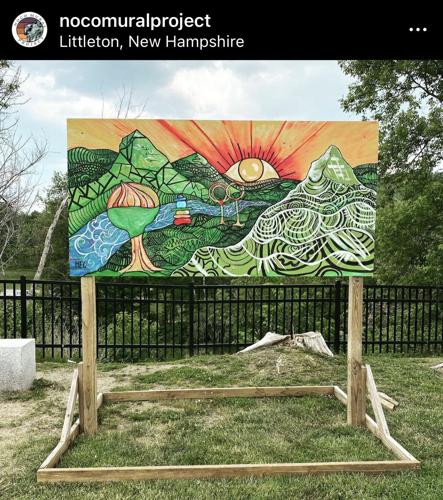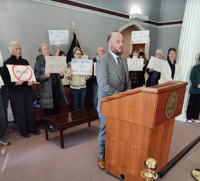LITTLETON — Artist Zach Johnsen, who owns the Baba Yaga gallery on Main Street, said he is worried what might happen to Littleton’s vibrant pro-art, live-and-let-live vibe if selectmen ban art in public places and do not renew the lease for Theatre UP at the municipally owned Littleton Opera House.
The arts, supporters say, are under attack in Littleton, an offensive mounted by a conservative selectman who isn’t happy with some of the artwork on display in town.
The selectmen expect to be updated soon by attorneys on whether a ban on art in public places is legal and what it might require.
Town Manager Jim Gleason said an attorney from the Mitchell Municipal Group, based in Laconia, met privately with the Board of Selectmen in late October and said she would get back to them in two to three weeks with an opinion.
A ban would be universal, Gleason said, and would prevent not only offensive art or words but potentially news-like items, such as the location, date and time of a charity car wash or a public gathering.
The paintings that kicked off the art controversy are still up on the Jing Fong building on Jackson Street. They depict an iris flower with a rainbow circle behind it; birch trees; and a book pierced by a dandelion. They are not depictions of anything evil, said Kerri Harrington, a co-chair of North Country Pride, but they are part of what she calls, “satanic panic — it’s all the rage in 2023.”
At the Board of Selectmen’s Aug. 28 meeting, Selectman Carrie Gendreau, who also represents District 1 in the state Senate, said, “I really think we need to be very careful about the kind of art that goes up.”
“This last artwork that went up on the side of the Jing Fong building, I would encourage anyone to research what that really means,” she said, without elaboration.
Gendreau, who declined to be interviewed for this story or provide comment, told The Boston Globe she follows the work of Jonathan Cahn, a messianic Jewish rabbi, who believes the U.S. has gone astray by allowing abortion and gay rights. Gendreau pointed to his work, according to the Globe, on how the “principalities of darkness” are making their way back to the United States.
She believes the pictures on Jackson Street — as well as a painting in Harmony Park that shows mountains, a stream, a small stack of rocks in the colors of a rainbow, and the sun depicted as an eye — are bringing that darkness to Littleton, she told the Globe.
Harrington said the aim of the three paintings on Jackson Street, commissioned by North Country Pride and funded by a diversity, equity and inclusion grant from the Granite United Way, was simply to “liven up the street,” which is off Main Street.
“What went up,” Gendreau said at the August meeting, “was not good, not good,” adding, ”I don’t want that to be in our town.”
Group’s lease in limbo
Selectmen have delayed acting on the lease for Theatre UP, which some say is a result of the nonprofit group’s support of the pro-LGBTQ community and production of shows like La Cage aux Folles.
Lynne Grigelevich, Theatre UP’s executive director, said the group would love to remain in the Littleton Opera House, where it has put on shows for much of the past decade.
The group pays Littleton about $20,000 annually to use the space for about 200 days each calendar year. When Theatre UP is not using the opera house, she said, it can be used by the town for its own purposes.
Theatre UP has received a $1 million federal grant to update the former Masonic Temple in downtown Littleton to use for offices, storage and a very small performance space. Ideally, the group said, it also would make improvements to the main performance space at the opera house.
While also exploring the possibility of building a performance space near the Masonic Temple, Theatre UP recently approached the town about doing a comprehensive assessment of the opera house, which would have cost $10,000, and also asked about it reconsidering a long-term lease.
During what Grigelevich called “an informal meeting” with Gleason and Selectman Linda MacNeil, she said Gleason told her that “given the current climate and our current affiliation with the LGBTQ community, he did not feel the selectmen would support a long-term lease or assessment-cost sharing.”
“We can’t consider entering into a long-term lease with a town whose goal is to get a ban on art in public places because that opens up the door for them to censor what we might do in any season, like with La Cage aux Folles,” Grigelevich said.
Not a good look
The widespread publicity about Littleton’s efforts to clamp down on the arts is not doing the town any favors, according to gallery owner Johnsen, who said he creates art that people who are in favor of banning art in public places might not find to their liking.
North Country Pride’s Harrington said she has gathered enough signatures to place an article on the 2024 Littleton Town Warrant to increase the Board of Selectmen from three to five members, which would make it more representative of the community. She also is considering a run for the board.
Meanwhile, the proposed public art ban and the board’s treatment of Theatre UP have boosted interest in and financial support of North Country Pride. Harrington said the American Civil Liberties Union of New Hampshire has obtained relevant documents from the town.
Like Johnsen, Harrington said the controversy about public art and the Theatre UP lease are hurting Littleton in the court of public opinion, which could result in a decrease in the number of visitors to the town.
Gleason, whose son Patrick was gay and who died several years ago from pancreatic cancer, said he will implement a ban on public art if it passes legal muster, but he doesn’t support it personally, a view that he has shared with the selectmen.
Contracted to serve as town manager through next May, which is also when the Theatre UP lease is up, Gleason said he realized that the complaints Gendreau made at a meeting in August about the Jackson Street paintings were not about the art “but who sponsored it ... North Country Pride.”
Because of his late son, Gleason said, he is an “ally” of the LGBTQ community and will continue to voice his opinion on how the Board of Selectmen deals with issues related to that community. He was clear, however, that he would continue to do his job as town manager, including implementing ordinances that are legal.
Asked whether he was concerned about losing his job, Gleason pointed out that he is an “at will” employee who can be dismissed anytime two of the three selectmen vote to get rid of him.
That said, if that does happen, the selectmen, per his contract, could terminate Gleason for cause, but that requires actual wrongdoing, not just an exercise of his free speech.
Harrington said the potential ban on public art has brought out large audiences to the Board of Selectmen’s meetings, estimating that 300 people attended the Sept. 11 meeting and 200 were at the meeting on Oct. 23.


















